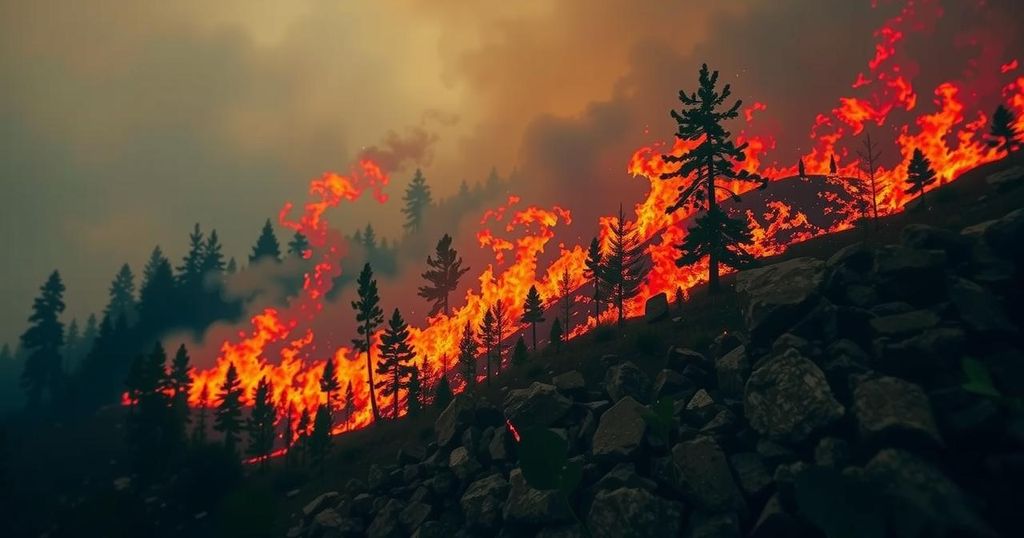Research Highlights Dire Impact of Climate Change on Wildfire Frequency and Associated Health Risks

Recent research has established a clear connection between climate change and the increased frequency and intensity of wildfires globally, resulting in a notable rise in smoke-related fatalities. Studies from renowned institutions have shown that while some regions experience reduced wildfire occurrences due to human activity, others, such as California and Siberia, have seen a significant uptick due to climatic changes. Overall, the data highlights an urgent need for combined efforts in emissions reduction and better fire management to address the growing crisis.
Research has conclusively established a direct correlation between climate change and the rising frequency and severity of wildfires globally. This trend is accompanied by a significant increase in associated smoke-related fatalities over recent decades. Two distinct studies conducted by research teams from Dalhousie University, Belgium, the UK, and Japan have explored the extent of wildfires and their public health implications, revealing a troubling escalation in both wildfire incidents and health outcomes. In the 1960s, it was estimated that there were fewer than 669 annual deaths attributed to wildfire smoke. This number drastically escalated to approximately 12,566 deaths annually by the 2010s. A pivotal study appearing in the journal Nature Climate Change compared wildfire predictive models incorporating climate change effects with those that did not, demonstrating a heightened incidence and intensity of wildfires in vulnerable ecosystems such as the African savannas, Australia, and Siberia. The research revealed significant regional variations in wildfire impact. For instance, while Africa sees a reduction in wildfires—largely due to human activities influencing land use and fragmentation—regions like California and Siberia are increasingly plagued by wildfires, driven by prolonged droughts and rising temperatures linked to climate change. Dr. Sian Kou-Giesbrecht, an associate professor at Dalhousie University, emphasized the significance of the findings, stating, “The study is important because it shows and quantifies the influence of climate change on increasing wildfires worldwide, especially given the impacts of wildfire on society and its feedback to climate change.” The research team employed advanced modeling techniques accounting for various influences such as climate conditions, vegetation types, and population densities. They concluded that while interventions like fire suppression and land management can mitigate wildfire impacts, they often do not suffice against the overwhelming influence of climate change—particularly during extreme weather episodes. According to Seppe Lampe, a climate scientist at Vrije Universiteit Brussel, “What is striking is that in periods with low to moderate numbers of fires, direct human interventions have a large effect. However, in periods with many fires, the effect of climate change dominates, meaning that in these cases we lose control.” The simulations indicated that between 2003 and 2019, climate change augmented the global area affected by wildfires by nearly 16 percent and heightened the likelihood of extended periods with above-average fire activity by 22 percent. A separate analysis also published concurrently found that the contribution of climate change to wildfire smoke-related deaths had escalated tenfold over the past fifty years. Researchers from the National Institute for Environmental Studies in Japan employed complex models to determine that up to 28 percent of fire-related deaths in the 2010s were attributable to climate change, compared to just one to three percent in the 1960s. Although attributing wildfires directly to climate change presents challenges due to various interacting factors, the studies provide robust evidence linking climate change with worsening wildfire outcomes and health impacts. Dr. Kou-Giesbrecht warned, “If the current pace of climate change continues, the area of burnt land and associated health impacts will increase significantly in the coming decades.” The implications of these findings underscore the urgent need for substantial and immediate reductions in greenhouse gas emissions alongside strategic landscape and fire management initiatives to stabilize the adverse impacts of wildfires on communities, health, and ecosystems.
The article examines the relationship between climate change and wildfires, detailing the increasing frequency and severity of these events in various parts of the world. It outlines research efforts that analyze the impacts of climate change on wildfire occurrences, revealing the significant health implications associated with smoke inhalation and related fatalities.
The studies highlight the critical influence of climate change on the increasing frequency and severity of wildfires globally, with direct consequences on public health. Interventions to mitigate wildfire impacts may not be sufficient amid extreme weather conditions exacerbated by climate change. Urgent measures are necessary to address greenhouse gas emissions and improve fire management strategies to protect vulnerable communities and ecosystems from the growing threat of wildfires.
Original Source: www.dal.ca







